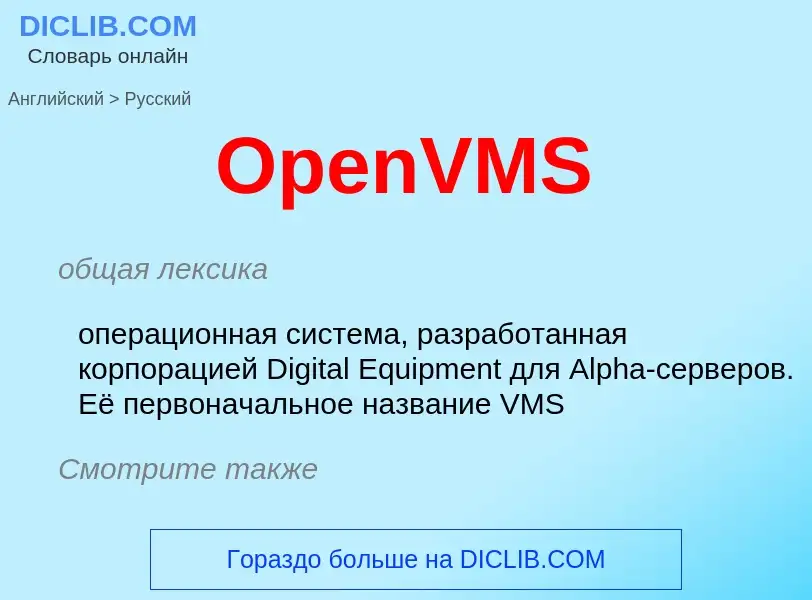Tradução e análise de palavras por inteligência artificial ChatGPT
Nesta página você pode obter uma análise detalhada de uma palavra ou frase, produzida usando a melhor tecnologia de inteligência artificial até o momento:
- como a palavra é usada
- frequência de uso
- é usado com mais frequência na fala oral ou escrita
- opções de tradução de palavras
- exemplos de uso (várias frases com tradução)
- etimologia
OpenVMS - tradução para russo
общая лексика
операционная система, разработанная корпорацией Digital Equipment для Alpha-серверов. Её первоначальное название VMS
Смотрите также
общая лексика
логическое имя
имя, присваиваемое ОС некоторому устройству или классу устройств для того, чтобы прикладное ПО не зависело от особенностей конструкции устройства. Например, логические имена дисков - A:, B:, C: и т.д.
антоним
Смотрите также
общая лексика
(Virtual Memory System) ОС VMS
ОС, разработанная в 1976 Digital Equipment Corp. для компьютеров VAX, затем была перенесена на Alpha-системы, в неё добавлена поддержка POSIX, и система была переименована в OpenVMS
в VME - независимая двухпроводная магистраль для обмена сообщениями между блоками системы, находящимися как в одном, так и в разных крейтах системы. Скорость передачи - до 3,2 Мбит/с
существительное
общая лексика
система виртуальной памяти
синоним
Wikipédia
OpenVMS, often referred to as just VMS, is a multi-user, multiprocessing and virtual memory-based operating system. It is designed to support time-sharing, batch processing, transaction processing and workstation applications. Customers using OpenVMS include banks and financial services, hospitals and healthcare, telecommunications operators, network information services, and industrial manufacturers. During the 1990s and 2000s, there were approximately half a million VMS systems in operation worldwide.
It was first announced by Digital Equipment Corporation (DEC) as VAX/VMS (Virtual Address eXtension/Virtual Memory System) alongside the VAX-11/780 minicomputer in 1977. OpenVMS has subsequently been ported to run on DEC Alpha systems, the Itanium-based HPE Integrity Servers, and select x86-64 hardware and hypervisors. Since 2014, OpenVMS is developed and supported by VMS Software Inc. (VSI). OpenVMS offers high availability through clustering — the ability to distribute the system over multiple physical machines. This allows clustered applications and data to remain continuously available while operating system software and hardware maintenance and upgrades are performed, or if part of the cluster is destroyed. VMS cluster uptimes of 17 years have been reported.

![VAXstation 4000 model 96 running OpenVMS V6.1, DECwindows Motif and the [[NCSA Mosaic]] browser VAXstation 4000 model 96 running OpenVMS V6.1, DECwindows Motif and the [[NCSA Mosaic]] browser](https://commons.wikimedia.org/wiki/Special:FilePath/DEC VAXstation 4000 96 OpenVMS 6.1.jpeg?width=200)



![The "Grey Wall" of VAX/VMS documentation, at [[Living Computers: Museum + Labs]] The "Grey Wall" of VAX/VMS documentation, at [[Living Computers: Museum + Labs]]](https://commons.wikimedia.org/wiki/Special:FilePath/Vax-vms-grey-wall.jpg?width=200)

